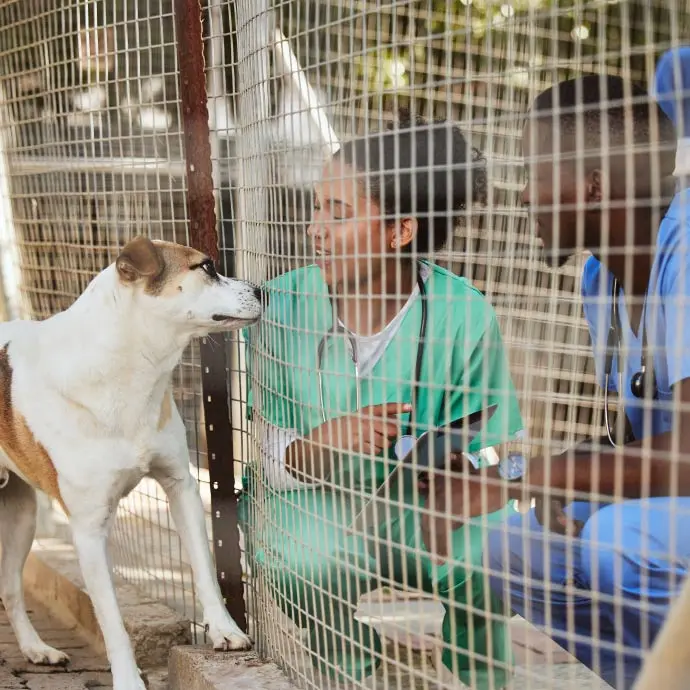The veterinary profession is built on a foundation of compassion, dedication, and a love for animals. But for many new graduates, that passion is increasingly burdened by the weight of student debt. With the cost of veterinary education rising faster than starting salaries, financial stress has become a defining challenge for the next generation of veterinarians.
A recent study by the American Veterinary Medical Association (AVMA) and the Veterinary Information Network (VIN) Foundation highlights how deeply student loans and financial uncertainty are impacting the well-being of new graduates. From repayment plans to overall career satisfaction, the findings paint a sobering picture of the financial hurdles veterinarians face early in their careers.
But there’s hope. By making informed, sustainable financial decisions, veterinarians can take ownership of their financial health and spend their energies providing exceptional care for patients. Whether it’s exploring repayment options, seeking trusted financial advice, or finding ways to save money in the workplace (securing their employment), small steps can make a big difference.

What the study taught us about new vets and your financial challenges
The study surveyed 235 veterinarians from the Class of 2021 (no particular institution), offering a revealing look at how student loans and financial pressures are shaping the lives of new graduates. The findings underscore the complex relationship between financial health and overall well-being in the veterinary profession.
1. 60% did not seek advice from a financial adviser
Despite the complexity of student loan repayment, the majority of respondents navigated their financial decisions without professional guidance. This highlights a potential gap in access to (or potentially awareness of) financial resources that could help new veterinarians make more informed choices.
2. Managing student loans was a top priority, but confidence was neutral
While paying off student debt ranked high on the list of financial concerns, many graduates reported feeling uncertain about their repayment plans. This lack of confidence suggests a need for better education and support around financial planning.
3. 22% had not decided how to repay their student debt
Nearly a quarter of respondents were still undecided about their repayment strategy, which could lead to missed opportunities for savings or even financial missteps. Early decision-making is critical to minimizing interest and avoiding default.
4. Median score of 4/7 for recommending the veterinary field
On a scale of 1 to 7, respondents gave a lukewarm recommendation for the veterinary profession, with a median score of 4. This ambivalence reflects the financial and emotional toll that student debt and financial stress can have on career satisfaction.
5. 50% opted for income-driven repayment plans
Half of the participants chose income-driven repayment plans, which adjust monthly payments based on earnings. While these plans can provide short-term relief, they may also extend the life of the loan and increase the total amount paid over time.
6. Financial counseling boosted confidence
Graduates who sought financial counseling reported feeling more confident in their repayment plans, underscoring the value of professional guidance in navigating complex financial decisions.
The study paints a clear picture that student debt is a significant factor in the well-being and career satisfaction of new veterinarians. The findings also highlight the importance of early financial planning and the need for accessible resources to help graduates make informed decisions.
What does this all mean, why do you care, and what can be done?
The study reveals critical insights into the financial challenges facing new veterinary graduates and creates opportunities for new vets (and employers of new vets) to reduce the pain of the reality of student loans.
60% did not seek advice from a financial adviser
What this means.
Navigating student loans and personal finances can be overwhelming, especially for new graduates who are just starting their careers. The fact that 60% of respondents did not seek professional financial advice suggests a gap in awareness, access, or affordability when it comes to financial counseling.
Why it matters.
Without guidance, graduates may miss out on opportunities to save money, make poor choices about repayment plans, or make decisions that could have long-term financial consequences.
What can be done.
Organizations like the VIN Foundation’s Student Debt Center offer tools and resources to help veterinarians understand their options.
Even a single session with a financial adviser can provide clarity and confidence in managing student loans.
Loan calculators, budgeting apps, and financial literacy websites can help graduates make informed decisions.
22% had not decided how to repay their student debt
What this means.
Nearly a quarter of respondents were still undecided about their repayment strategy, which could delay their progress and increase the overall cost of their loans.
Why it matters.
Delaying repayment decisions can lead to missed opportunities for savings, such as lower interest rates or loan forgiveness programs. It can also result in default if graduates aren’t proactive about their options.
What can be done.
Don’t wait until repayment begins to explore your options. Research and compare plans well in advance.
Some repayment plans, like Public Service Loan Forgiveness (PSLF), are better suited for certain career trajectories.
Reach out to trusted resources or financial counselors to help you make an informed decision.
Median score of 4/7 for recommending the veterinary field
What this means.
New graduates are ambivalent about recommending the veterinary profession, with a median score of 4 out of 7. This lukewarm endorsement reflects the financial and emotional toll of student debt and other challenges.
Why it matters.
A lack of enthusiasm from new graduates could have long-term implications for the profession, including recruitment, retention, and overall morale.
What can be done.
By tackling student debt and improving financial literacy, the profession can help restore confidence and satisfaction among new graduates.
Employers can play a role by offering supportive work environments, competitive salaries, and benefits like student loan repayment assistance.
Encourage organizations and institutions to address the root causes of financial stress, such as the rising cost of education.
50% opted for income-driven repayment plans
What this means.
Half of the respondents chose income-driven repayment plans, which adjust monthly payments based on earnings. While these plans can provide short-term relief, they may also extend the life of the loan and increase the total amount paid over time
Why it matters.
Income-driven plans can be a valuable tool for managing cash flow, but they’re not a one-size-fits-all solution. Graduates need to weigh the pros and cons based on their individual circumstances.
What can be done.
Compare income-driven plans with other repayment strategies to determine what works best for your financial situation.
Consider how your repayment plan aligns with your career goals and financial objectives.
As your income and circumstances change, revisit your repayment strategy to ensure it still meets your needs.
Financial counseling boosted confidence
What this means.
Graduates who sought financial counseling reported feeling more confident in their repayment plans, highlighting the value of professional guidance.
Why it matters.
Confidence in financial decisions can reduce stress, improve well-being, and set the stage for long-term financial stability.
What can be done.
Organizations like the VIN Foundation offer free or low-cost financial counseling tailored to veterinarians.
Consider financial counseling as an investment in your future, rather than an unnecessary expense.
Encourage peers to seek guidance and share resources to build a more financially savvy veterinary community.
Expert insights from Dr. Anne Chavent
The findings highlight the complexities of managing student debt and personal finances as a new veterinary graduate.
According to Dr. Annie Chavent, Assistant Director for Early Career Initiatives in the AVMA’s Membership and Field Services Division, there’s no one-size-fits-all solution to navigating these challenges.
“Offering individualized advice is an advantage over trying to create a formula for what the best plan is,” Dr. Chavent explains. “We not only want to make sure we support new veterinarians as they make these [financial] decisions but also take a holistic view of how to improve well-being.”
This emphasis on individualized support underscores the importance of tailoring financial strategies to each graduate’s unique circumstances. For example, a veterinarian working in a high-cost urban area may have different financial needs than one in a rural practice with lower living expenses. Similarly, those pursuing specialized training or working in nonprofit settings may benefit from specific repayment or forgiveness programs.
Dr. Chavent’s insights also highlight the connection between financial health and overall well-being. Financial stress can take a toll on mental health, job satisfaction, and even the quality of patient care.
Individualized advice matters
There’s no universal solution to student debt. Graduates should seek guidance that aligns with their specific financial situation, career goals, and lifestyle.
Holistic well-being is key
Financial health is deeply intertwined with mental and emotional well-being. Addressing financial stress can have a ripple effect on overall quality of life.
Support is available
Resources like the VIN Foundation’s Student Debt Center are there to help veterinarians navigate these challenges.
What the data signals in a broader sense
The financial challenges highlighted in the AVMA and VIN Foundation study have far-reaching implications for the well-being of veterinarians, the sustainability of the profession, and the quality of care provided to animals.

About mental health and wellbeing
Financial stress is a well-documented contributor to mental health issues, including anxiety, depression, and burnout. For veterinarians, who already face high rates of emotional strain due to the nature of your work, student debt can exacerbate these challenges.

About career satisfaction and retention
The study’s finding that new graduates gave a median score of 4/7 for recommending the veterinary field speaks volumes about the profession’s current challenges. Financial stress can lead to disillusionment, making it harder to attract and retain talented individuals.
If financial pressures continue to mount, the profession risks losing passionate, skilled veterinarians to other fields or early retirement.
By addressing student debt and improving financial literacy, the veterinary community can foster greater job satisfaction and long-term career commitment.

About access to veterinary care
Financial stress in the veterinary profession can also impact the communities you serve. Vets burdened by debt may be less likely to work in underserved areas or pursue lower-paying but critically important roles, such as shelter medicine or public health.
When vets are forced to prioritize higher-paying jobs to manage debt, it can limit access to care for animals in need.

About the environmental and economic impact of financial stress
Financial stress can influence the decisions veterinarians make in their practices. For example, those struggling with debt may feel pressured to cut costs, which could lower the quality of care in the practice. A snowballing effect that hurts the viability of the clinic.
Practices that invest in cost-effective, eco-friendly solutions, like refurbished veterinary infusion pumps equipment, can reduce waste and save money without compromising care.
By making smart, sustainable choices, veterinarians can ease financial pressures while contributing to a healthier planet.

About a holistic approach to wellbeing for new vets (and those still paying debts years later)
As Dr. Annie Chavent noted, addressing financial challenges requires a holistic view of well-being. This means creating a workplace culture that prioritizes mental health, work-life balance, and professional fulfillment.
Veterinarians, educators, and industry leaders all have a role to play in building a more supportive and sustainable profession.
By tackling financial stress head-on, the veterinary community can create a brighter future for its members and the animals you care for.
Where to look for help right now?
The VIN Foundation Student Debt Center is loaded with resources to help with the next steps toward paying off your debt.
Follow this link for all the free resources.
For veterinarians working toward paying off student loans while running a new practice - or even veteran vets who just haven’t made it to that finish line yet, one of the best ways to manage costs, you can can stay more profitable and pay off your loans earlier, is to opt for refurbished equipment over new, and repairs over replacements.
Get in touch with our team or find information about refurbished infusion pumps here.